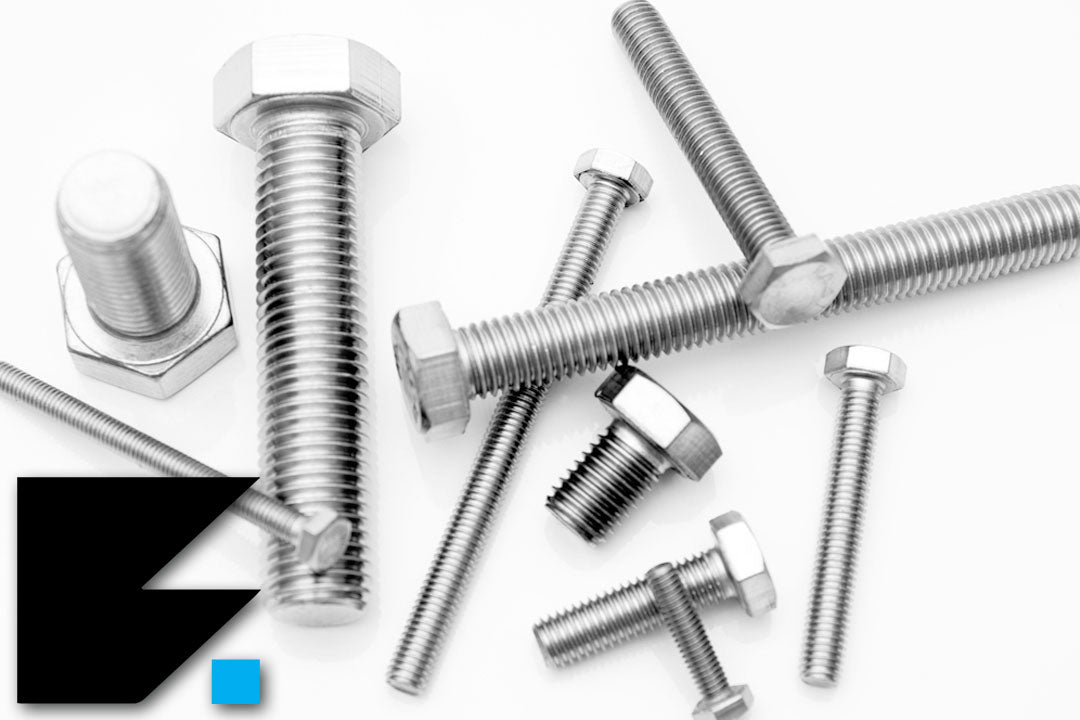A set screw, sometimes referred to a fully threaded bolt, is a type of fixing that is similar to a bolt, but is fully threaded. This allows for them to be tightened and loosened using standard spanners, without needing access to the underside of the fastener. Most engineers would class them as a bolt, although their name might suggest that they are a screw!
In this article we'll explore the different types of set screws available and discuss the difference between set screws and grub screws another type of fixing screw often used in similar scenarios but with some significant differences that make them stand apart from each other.
Set Screw Basics
Set screws conform to DIN 933 standard and are essentially a fully threaded hex bolt. They are commonly used to hold collars, pulleys or gears on shafts in ironmongery and joinery applications.
They are similar to hex bolts in that they are driven into a tapped hole and maintain the same diameter along their length.
There are several types of set screw points available, which are often confused with hexagon set screws as we know them. These include cone point, cup point, flat point, knurled cup point, oval point, and half-dog point.

Set Screws vs. Hex Bolts
While fully threaded bolts set screws and stainless steel hex bolts may look similar, they have key differences that make them suitable for different applications. Set screws, often referred to as fully threaded bolts, have threading along their entire length, which provides a strong grip and makes them ideal for metal-to-metal or metal-to-wood connections. They are typically used when you need a secure, flush finish without a protruding head, such as in machinery assembly or construction tasks that require firm fastening without the need for nuts.
Hex bolts, on the other hand, have a partially threaded shaft and a hexagonal head, allowing for easy tightening with a wrench or socket. These bolts are usually paired with a nut to secure materials, making them a popular choice for applications that require higher clamping force, like heavy-duty construction and structural work.
In summary, if you need a low-profile, fully threaded fastening solution, set screws are the way to go. For applications requiring higher strength and a nut-and-bolt setup, hex bolts are the better option.
Set Screw vs Grub Screw?
Set screws (fully threaded bolts) can often be confused with grub screws. Grub screws are fully threaded with no protruding head, while set screws often feature a hexagon head and are fully threaded with the same diameter thread the whole way down.
Grub screws are designed to be driven into an existing tapped hole or socket and offer better resistance to weathering and corrosion. They can also be driven with more torque force than traditional screws, making them ideal for situations where a standard nut and bolt would impede optimal functioning.
Both types of fasteners have their specific functions, so it's essential to choose the right type based on your particular application needs.
Where are Set Screws Used?
They have many uses in engineering, most often used in conjunction with mating male and female thread components. The set screw tightens against the male thread component. It may do this by pulling on the female component if it has no captive nut, or vice versa if it does. They are also used to fix bearings, pulleys and other rotating parts in place.
Set screws generally use either a right-hand (clockwise) set, but sometimes you will come across left-hand (anti-clockwise) set, which is determined by the thread direction.
The most common stainless steel sizes are M14 fully threaded bolts and M16 hex head set screws.
Set Screw Material Compositions
Set screws come in a vast array of finishes, shapes and sizes which are suitable for different needs.
Beginning with their material composition, there are three main options available at Fixabolt. For outdoor projects exposed to the elements, A2 stainless steel is often most appropriate due to its anti-corrosion properties. Where anti-rust is not a priority, particularly for interior projects, bright zinc plated (BZP) set screws offer medium level of corrosion resistance but have the highest tensile strength at 8.8.
Bright Zinc Plated (BZP)
The biggest sizes generally require a greater amount of load-bearing. This means that they need to be able to stand up to the large pressure from heavy loads. This is why bright zinc plated (BZP) is the only available option in large, as they have the highest tensile strength possible. You will only find M24 and M27 hexagon set screws in this finish for this reason.
A2 Stainless Steel
For outdoor projects, stainless steel is often the preferred choice. Although stainless steel set screws are not always suitable for severely heavy loads, they have the greatest rust resistance, making them the best choice for most exterior projects. Our A2 70 stainless steel set screws also have slightly more play in them, meaning that over time they can adjust slightly with their surroundings without breaking. For example, a stainless steel M8 coach bolt may used in decking that could sink slightly over time.
Brass
There is also an aesthetic option available, with the brass version being a popular choice for interior designers that desire a more rustic look. This is a softer metal, so more care must be taken when using them.

